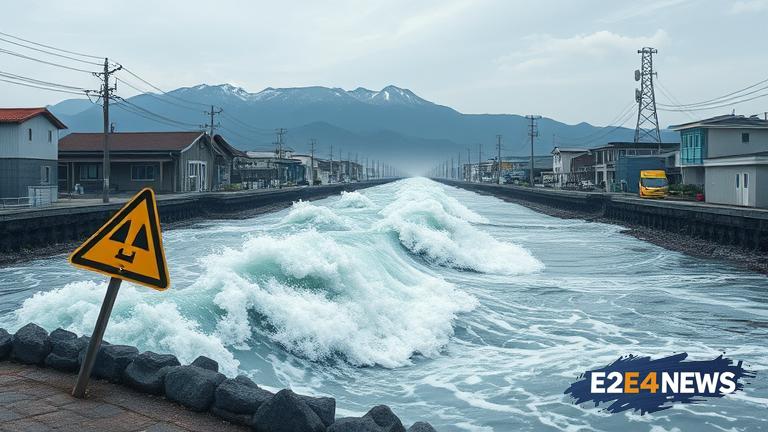A tsunami warning was issued in Japan, sparking fears of a repeat of the 2011 Fukushima disaster. The warning was triggered by a powerful earthquake that struck off the coast of Japan, causing widespread panic and evacuation alerts. The Fukushima disaster, which occurred on March 11, 2011, was one of the worst nuclear accidents in history, resulting in the deaths of over 15,000 people and displacing hundreds of thousands more. The disaster was caused by a massive earthquake and tsunami that struck the Fukushima Daiichi nuclear power plant, leading to a series of equipment failures and radioactive material releases. The recent tsunami warning has raised concerns about the safety of Japan’s nuclear power plants and the country’s preparedness for natural disasters. The Japanese government has been working to improve disaster preparedness and response, including the implementation of new safety measures and evacuation drills. However, many residents in affected areas are still traumatized by the memories of the Fukushima disaster and are calling for greater transparency and accountability from the government and nuclear industry. The Fukushima disaster had a significant impact on Japan’s economy, environment, and society, with many communities still struggling to recover. The disaster also led to a significant shift in Japan’s energy policy, with a greater emphasis on renewable energy sources and reduced reliance on nuclear power. Despite these efforts, Japan still faces significant challenges in terms of disaster preparedness and response, including aging infrastructure, inadequate evacuation routes, and insufficient emergency funding. The recent tsunami warning has highlighted the need for continued vigilance and investment in disaster preparedness and response measures. The Japanese government has announced plans to increase funding for disaster preparedness and response, including the development of new evacuation drills and emergency response systems. However, many experts argue that more needs to be done to address the underlying causes of the Fukushima disaster, including inadequate safety measures and regulatory failures. The Fukushima disaster has also had a significant impact on the global nuclear industry, with many countries re-evaluating their nuclear energy policies and safety standards. The disaster has also raised concerns about the long-term health and environmental impacts of nuclear accidents, with many residents in affected areas experiencing ongoing health problems and radiation exposure. The Japanese government has established a number of programs to support affected residents, including compensation schemes and health monitoring programs. However, many residents are still waiting for justice and accountability, with some calling for greater transparency and accountability from the government and nuclear industry. The recent tsunami warning has also highlighted the importance of international cooperation and knowledge-sharing in disaster preparedness and response, with many countries offering support and assistance to Japan. The United Nations has also played a key role in supporting Japan’s disaster response efforts, including the provision of technical assistance and emergency funding. Despite the challenges and controversies surrounding the Fukushima disaster, Japan has made significant progress in terms of disaster preparedness and response, with many experts praising the country’s resilience and adaptability. However, more needs to be done to address the underlying causes of the disaster and to ensure that Japan is better prepared for future natural disasters. The recent tsunami warning has served as a reminder of the importance of continued vigilance and investment in disaster preparedness and response measures, and the need for greater transparency and accountability from the government and nuclear industry.
